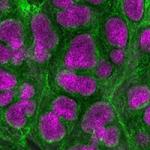
Research Topics
The Section's interest is in cellular and molecular mechanisms involved in immune and autoimmune responses affecting the eye and vision. (1) Vision can be compromised by an inflammatory autoimmune disease known as uveitis, which destroys the neuroretina and is a major cause of blindness. We aim to understand the basic mechanisms that trigger and drive the disease. The studies center on development and maintenance of self-tolerance to immunologically privileged retinal antigens, on defining the natural triggers that lead to their pathological breakdown, and on experimental modulation of the pathogenic responses that follow. (2) Vision can also be compromised by damage to the surface of the eye. We study the mucosal immune responses of the ocular surface, which constitutes a barrier between the eye and the environment to define how the eye deals with diverse environmental stimuli. Because basic cellular and molecular mechanisms involved in disease are often difficult to study in humans, our experimental approaches rely heavily on animal models. Cutting edge approaches involving gene manipulated mice, multicolor flow cytometry, genomic and transcriptomic analyses, the study of the microbiome and bioinformatic predictions are used to dissect fundamental immune processes in health and disease. The approaches and conclusions are broadly generalizable to other autoimmune and inflammatory disease models and their human counterparts. The goal is to use the knowledge gained from these studies for designing novel and rational strategies for immunotherapy.
Biography
Dr. Rachel Caspi received her doctoral training in Israel and her postdoctoral training at the National Institutes of Health (NIH) in Bethesda, MD, USA. She is a tenured Senior Investigator at NIH and serves as a Section Head of the Immunoregulation Section and Chief of the Laboratory of Immunology, National Eye Institute, NIH. She also holds an Adjunct Professorship at the University of Pennsylvania School of Medicine. Dr. Caspi's research centers on tolerance and autoimmunity to immunologically privileged retinal antigens in animal models of autoimmune uveitis, a potentially blinding human disease. She developed the mouse model uveitis, now in use worldwide. Her studies have elucidated many basic mechanisms of pathogenesis and helped to devise clinically relevant immunotherapeutic approaches. She is particularly well known for her work on effector and regulatory T cells in pathogenesis of ocular autoimmunity. The work she and her group have published is broadly applicable to autoimmunity in general. She is the recipient of numerous honors and awards, most recent of which was the 2010 Friedenwald award, one of the two highest awards in the field of vision research, and has authored and co-authored >200 publications.
Selected Publications
- Agarwal RK, Kang Y, Zambidis E, Scott DW, Chan CC, Caspi RR. Retroviral gene therapy with an immunoglobulin-antigen fusion construct protects from experimental autoimmune uveitis. J Clin Invest. 2000;106(2):245-52.
- Chong WP, Mattapallil MJ, Raychaudhuri K, Bing SJ, Wu S, Zhong Y, Wang W, Chen Z, Silver PB, Jittayasothorn Y, Chan CC, Chen J, Horai R, Caspi RR. The Cytokine IL-17A Limits Th17 Pathogenicity via a Negative Feedback Loop Driven by Autocrine Induction of IL-24. Immunity. 2020;53(2):384-397.e5.
- Luger D, Silver PB, Tang J, Cua D, Chen Z, Iwakura Y, Bowman EP, Sgambellone NM, Chan CC, Caspi RR. Either a Th17 or a Th1 effector response can drive autoimmunity: conditions of disease induction affect dominant effector category. J Exp Med. 2008;205(4):799-810.
- Horai R, Zárate-Bladés CR, Dillenburg-Pilla P, Chen J, Kielczewski JL, Silver PB, Jittayasothorn Y, Chan CC, Yamane H, Honda K, Caspi RR. Microbiota-Dependent Activation of an Autoreactive T Cell Receptor Provokes Autoimmunity in an Immunologically Privileged Site. Immunity. 2015;43(2):343-53.
- St Leger AJ, Desai JV, Drummond RA, Kugadas A, Almaghrabi F, Silver P, Raychaudhuri K, Gadjeva M, Iwakura Y, Lionakis MS, Caspi RR. An Ocular Commensal Protects against Corneal Infection by Driving an Interleukin-17 Response from Mucosal γδ T Cells. Immunity. 2017;47(1):148-158.e5.
Related Scientific Focus Areas



Microbiology and Infectious Diseases
View additional Principal Investigators in Microbiology and Infectious Diseases


This page was last updated on Friday, August 1, 2025